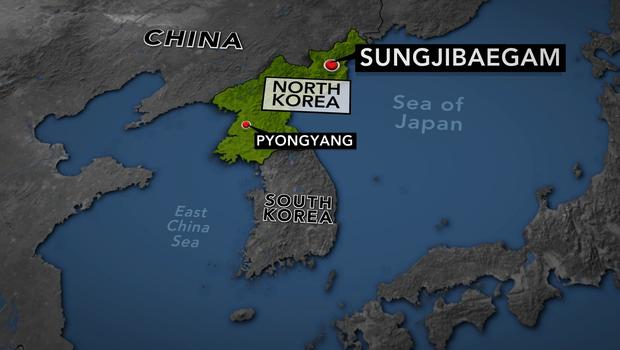
SEOUL, South Korea -- North Korea claimed early Wednesday
it had conducted a hydrogen bomb test, its fourth nuclear test.
The announcement, broadcast on North Korea's state-run media, called the test "successful." The surprise announcement complicates already difficult efforts
to curb the country's push for a working nuclear arsenal.
A hydrogen bomb is generally more powerful than a nuclear bomb.
A confirmed test would mark another big step toward Pyongyang's goal of building
a warhead that can be mounted on a missile capable of reaching the U.S. mainland.
a warhead that can be mounted on a missile capable of reaching the U.S. mainland.
The claim came after South Korean officials detected what they described as an "artificial earthquake" in the area where North Korea conducted its three previous nuclear tests.
The U.S Geological Survey measured the magnitude of the seismic activity
at 5.1 on its website. It was centered about 12 miles from Sungjibaegam at a
depth of 6.2 miles, according to the USGS.
at 5.1 on its website. It was centered about 12 miles from Sungjibaegam at a
depth of 6.2 miles, according to the USGS.
An official from the Korea Metrological Administration, South Korea's
weather agency, said it believed the earthquake was caused artificially based
on their analysis of the seismic waves and that it originated 30 miles north of Kilju,
the area where North Korea's main nuclear test site is located.
weather agency, said it believed the earthquake was caused artificially based
on their analysis of the seismic waves and that it originated 30 miles north of Kilju,
the area where North Korea's main nuclear test site is located.
China's Earthquake Network Centre said on its website the quake was at ground level, describing it as a "suspected explosion," AFP reported. Officials in Japan also expressed concern about a possible nuclear test.
U.S. officials were "looking into" the event, CBS News Pentagon correspondent David Martin reported.
The South Korean president's office convened an emergency meeting of
the National Security Council.
the National Security Council.
North Korea conducted its third nuclear test in February 2013. Prior tests were conducted in 2006 and 2009.
Another test would further North Korea's international isolation by prompting
a push for new, tougher sanctions at the United Nations and worsening
Pyongyang's already bad ties with Washington and its neighbors.
a push for new, tougher sanctions at the United Nations and worsening
Pyongyang's already bad ties with Washington and its neighbors.
Pyongyang is thought to have a handful of crude nuclear weapons.
The United States and its allies worry about North Korean nuclear tests
because each new blast brings the country closer to perfecting its nuclear arsenal.
The United States and its allies worry about North Korean nuclear tests
because each new blast brings the country closer to perfecting its nuclear arsenal.
Since the elevation of young leader Kim Jong Un in 2011, North Korea
has ramped up angry rhetoric against the leaders of allies Washington
and Seoul and the U.S.-South Korean annual military drills it considers
invasion preparation.
has ramped up angry rhetoric against the leaders of allies Washington
and Seoul and the U.S.-South Korean annual military drills it considers
invasion preparation.

Δεν υπάρχουν σχόλια:
Δημοσίευση σχολίου